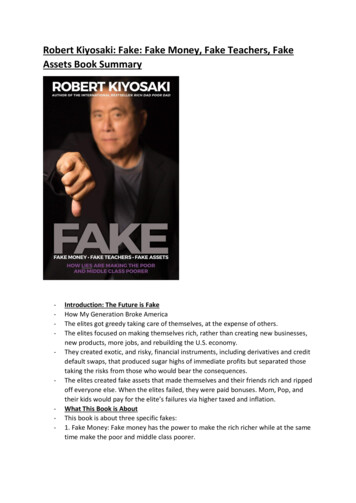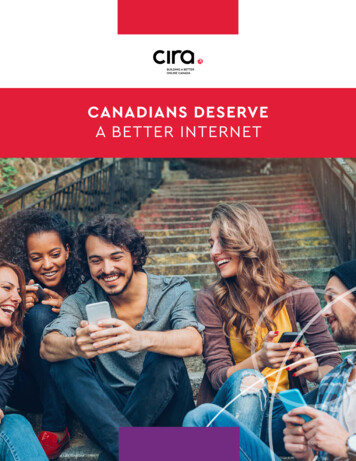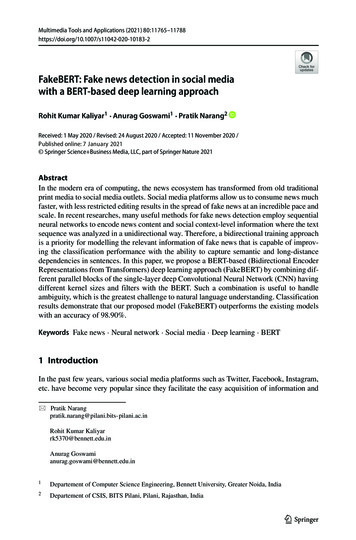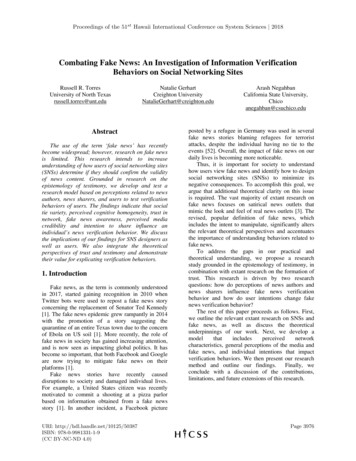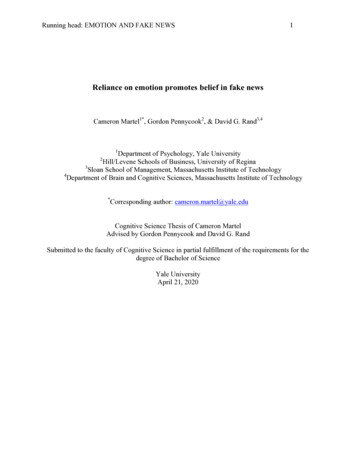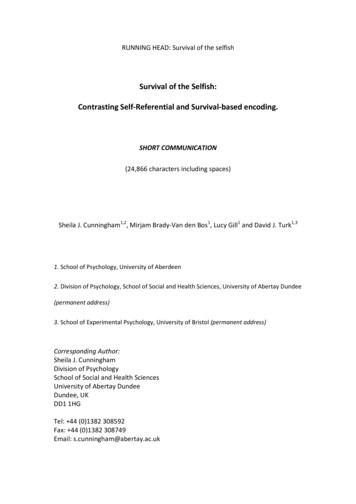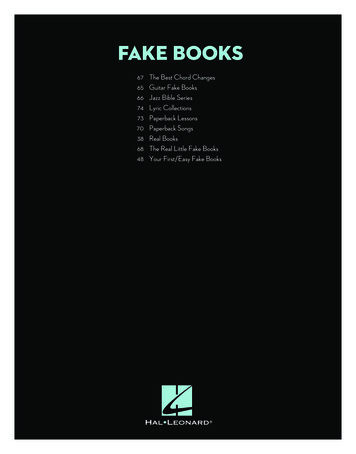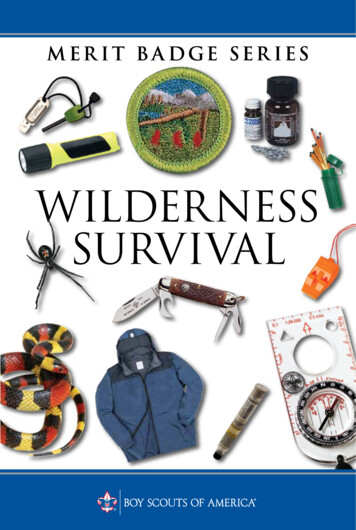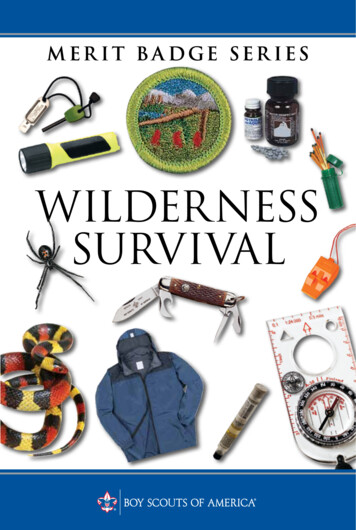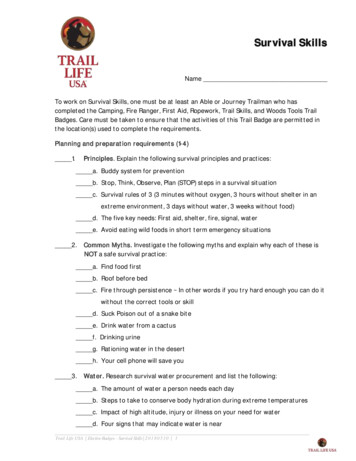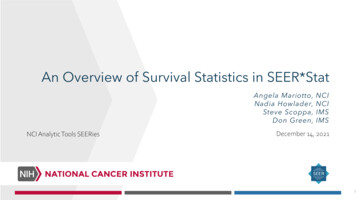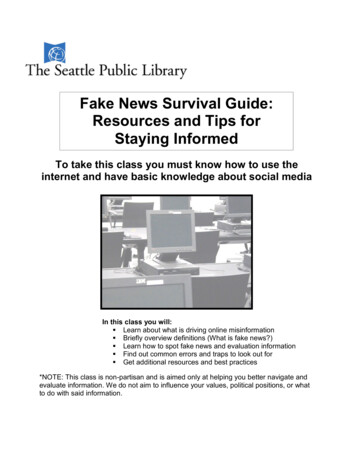
Transcription
Fake News Survival Guide:Resources and Tips forStaying InformedTo take this class you must know how to use theinternet and have basic knowledge about social mediaIn this class you will: Learn about what is driving online misinformation Briefly overview definitions (What is fake news?) Learn how to spot fake news and evaluation information Find out common errors and traps to look out for Get additional resources and best practices*NOTE: This class is non-partisan and is aimed only at helping you better navigate andevaluate information. We do not aim to influence your values, political positions, or whatto do with said information.
Vocabulary TermsAffiliate Marketing - Affiliate marketing is an advertising model where a company payscompensation to third party publishers to generate traffic or leads to the company’s productsand services. The third party publishers are referred to as affiliates and the commission feeincentivizes them to find ways to promote the iate-marketing.aspClickbait - (on the Internet) Content whose main purpose is to attract attention andencourage visitors to click on a link to a particular web page. Oxford American CollegeDictionary.Disinformation - False information deliberately and often covertly spread (as by theplanting of rumors) in order to influence public opinion or obscure the truth. MerriamWebster Dictionary.Echo Chamber (media) - A metaphorical description of a situation in which information,ideas, or beliefs are amplified or reinforced by communication and repetition inside a definedsystem. Inside a figurative echo chamber, official sources often go unquestioned anddifferent or competing views are censored, disallowed, or otherwise o chamber (media)Engagement (social media) - Engagement measures how much and how often othersinteract with you and your content in social media. When someone takes the time to like,favorite or comment on something you’ve posted, they’re actively engaging with yourcontent. ent/Fake News - False information or propaganda published, especially online, under the guiseof being authentic news. http://webopedia.com/TERM/F/fake-news.htmlFilter Bubble - The intellectual isolation that can occur when websites make use ofalgorithms to selectively assume the information a user would want to see, and then giveinformation to the user according to this assumption. Term coined by Internet activist EliPariser in his book “The Filter Bubble.” bubbleFourth Estate - The public press. Merriam-Webster Dictionary.Information Literacy - The skill required to recognize when information is needed and beingable to efficiently locate, accurately evaluate, effectively use, and clearly communicateinformation in various formats. ined.htmlIntellectual Freedom - Intellectual freedom is the right of every individual to both seek andreceive information from all points of view without restriction. It provides for free access to all-1Seattle Public Library
expressions of ideas through which any and all sides of a question, cause or movement maybe explored. – American Library AssociationInternet Bot - An Internet bot, in its most generic sense, is software that performs anautomated task over the Internet. et-botInternet Meme - A concept or idea that spreads "virally" from one person to another via theInternet. http://www.webopedia.com/TERM/I/internet meme.htmlMisinformation - Incorrect or misleading information. Merriam-Webster Dictionary.Native Advertising - Material in an online publication which resembles the publication'seditorial content but is paid for by an advertiser and intended to promote the advertiser'sproduct. Oxford American College Dictionary.Net Neutrality - a network design paradigm that argues for broadband network providers tobe completely detached from what information is sent over their networks. In essence, itargues that no bit of information should be prioritized over another.https://www.ocf.berkeley.edu/ raylin/whatisnetneutrality.htmPartisan - a firm adherent to a party, faction, cause, or person; especially: oneexhibiting blind, prejudiced, and unreasoning allegiance. Merriam-WebsterDictionary.Satire - The use of humor, irony, exaggeration, or ridicule to expose and criticize people'sstupidity or vices, particularly in the context of contemporary politics and other topical issues.Oxford American College Dictionary.Social Media - Forms of electronic communication (as websites for social networkingand microblogging) through which users create online communities to shareinformation, ideas, personal messages, and other content (as videos). MerriamWebster Dictionary.Social Networking Site - Any website that allows users to create public profiles within thatsite and form relationships with other users who access their profile.http://www.webopedia.com/TERM/S/social networking site.htmlViral - An image, video, advertisement, etc., that is circulated rapidly on the Internet. OxfordAmerican College Dictionary.Viral Marketing - In Internet and online advertising viral marketing is a type of marketingtechnique that relies on and encourages people to pass along a marketing message byword-of-mouth (or word-of-e-mail) marketing. Viral marketing online uses blog and socialnetworks to produce positive word-of-mouth brand awareness.http://www.webopedia.com/TERM/V/Viral Marketing.html-2Seattle Public Library
“Never trust a quoteyou read in a FakeNews class”– Abraham LincolnFake Abraham Lincoln QuoteThe Information Cycle“Falsehood flies, and the Truth comes limping after it; so that when Men come to beundeceiv’d, it is too late; the Jest is over, and the Tale has had its Effect”- JonathanSwiftWhat Is the Information Cycle?The information cycle is the progression of media coverage of a newsworthy event.Understanding the information cycle can help you determine what kind of information youare likely to find about your topic. Source: Undergraduate Library, University of Illinois at UrbanaChampaign.-3Seattle Public Library
-4Seattle Public Library
Where Are We Now? The Landscape of News andInformationWhere People“Often” Get TheirNews:Where People Get Their News(percentage)60- 57% from TV50- 2 in 5 people fromonline40- 1 in 4 from print30- 1 in 5 from ne Sources29- Some get theirnews from acombination, butmost have oneplatform- 35% direct fromnews website35-36% from socialmedia36News websiteSocial mediaOther (email, search engine, etc)“Now, only about a third of the U.S. has any trust in the Fourth Estate, a stunningdevelopment for an institution designed to inform the public.”June 2016 Gallup ust-mass-media-sinks-new-low.aspx-5Seattle Public Library
- Americans overwhelmingly see the news media as biased- In the U.S. roughly nine-in-ten adults (93%) get at least some news online.- Online news stories are more piecemeal, emphasis on immediacy and mobility- 64% of adults say fabricated news stories cause a great deal of confusion aboutthe basic facts of current issues and events- Around two-thirds (68%) of U.S. adults use Facebook, and around four-in-tenU.S. adults (43%) get news from Facebook.- Many adult Facebook users in the U.S. lack a clear understanding of how theplatform’s news feed works.- 23% say they have shared a made-up news story – either knowingly or not- 59% of all links shared on Twitter are shared without reading e media are being driven further and further into the cut-and pasterealm by the unforgiving economics of post-scarcity information. It’sexpensive to be a primary newsgatherer.”– Charles Seife, from his book “Virtual Unreality”What is Fake News?“Fake news, or hoax news, refers to false information or propaganda publishedunder the guise of being authentic news. Fake news websites and channels pushtheir fake news content in an attempt to mislead consumers of the content andspread misinformation via social networks and word-of-mouth.” tml-6Seattle Public Library
Graphic by Claire Wardle, reprinted with permission from First Draft News: ted-d0f773766c79- Misinformation, and disinformation are not new phenomenon, but since the 2016election cycle, the circulation of falsehoods on social media have become much moreprevalent.- Usually fake stories published on websites that look like legitimate news sites. Fakenews sites mimic real news websites in layout, headings, writing, and more.- Sensational headlines (“clickbait”) and writing, often highly partisan and political- Often part of a money making scheme- Domain names often sound like they would be based in the US, but they may not be.Ex: http://USAPolitics.com (note: domain no longer used as of Mar. 2017).- Fake news sites will often imitate a real news site by using the name of the real newssite in the URL, for example: /mywashingtonpost.com/.- Don’t just take someone’s word that a source is “fake news.” Always check for yourselfwhether information is correct.-7Seattle Public Library
Trends in 2017:- Fake crime stories dominated- World News Daily Report benefited from the most Facebook engagements- Prevalence of “create your own news” websites- Emergence of news networks created by one person running multiple fake newssites- Copycat sites based in Eastern EuropeSource: 50-of-the-biggest-fake-news-hits-onfacebook-in?utm term .sjYy6oPb2R#.anjZ0qJQBkExample 1: Compare FakeNews Site with Real News SiteURL is similar to a real newssiteLogo is the same or similar asreal news siteLayout imitates real news site-8Seattle Public Library
Example 2:Social media chain-letter style posts or messages-9Seattle Public Library
Activity # 1: Snopes Fact CheckingGo to http://snopes.com and click on a story that has been fact checked. What doesSnopes’ report look like? How do they cite their evidence? This will get us thinkingabout how to check our sources.Example 3:BuzzFeed News’s “These Are 50 Of The Biggest FakeNews Hits On Facebook In 2018”Full list available here: https://goo.gl/BhZmpZ- 10 Seattle Public Library
Source: 50-of-the-biggest-fake-news-hits-onfacebook-in?utm term .vaL627dNk#.yrZZemMPKExample 4:Why it is surprisingly easy to create fake newsActivityof#React365,2: CreatingFakeNewsHomepagea site thatallowspeople to create fake news articles to "prank their friends"Go to http://react365.com. Create a fake news article title, write a sentence or two inthe description, and pick an image below. Click the “create and publish” button on thebottom. “Create your own news” sites are on the rise.Disclaimer: This is just for demonstration purposes. We highly discourage usingtools like this to create fake news, even if it’s just as a “prank” to your friendson social media. There is always the possibility that your friends, or friends offriends will see the content and believe it is real, then share it with others.PLEASE avoid websites like this, and refer to the links provided in this packet ofwebsites to avoid (or at least to be highly skeptical of).- 11 Seattle Public Library
Evaluating InformationExample 5: Living Voter’s GuideDuring 2012 and 2013, The Seattle Public Library’s Business, Science and Technologydepartment partnered with Seattle CityClub to provide a fact-checking service for theirLiving Voters’ Guide, a “non-partisan, community-generated online voters’ guidethat offers a safe space for civil online discussion about each November’s initiatives,ballot measures and congressional candidate races across Washington State.” Source:https://livingvotersguide.org/about#fact checkFact checks were labeled as follows: Consistent with sources found. The sources we found support or areconsistent with the claim. Inconclusive given sources found. The information we found neitherconfirms nor denies the accuracy of the claim. In some cases this might be used where wefound two different sources which fall on either side of the claim. In other cases it might beused where one source can be interpreted in more than one way. Inconsistent with sources found. Sources we found conflict with or areinconsistent with the claim. Outside the scope of the service. Some reasons for this might be - itwould require; more in-depth analysis which would take more time than the service allows,in-depth legal or financial analysis, evaluation of the merits of value or opinion statements,evaluation of the likelihood of hypothetical statements. In each case, we would explainwhy it is outside the scope.- 12 Seattle Public Library
Cheat Sheet for Evaluating Claims and Stories (questions to askyourself):Check the Source-Does it have a strange URL?Do you know who the source is? Is it from a common news site? Is it from a newssite known to be fake or unreliable?Does a quick search of the name of the website raise any suspicions?Can you confirm, using reverse image search, if the images used in the exampleare authentic?Read Beyond the Headline-Does the headline match the example’s content?How does the example compare to what you already know?Does the information make sense? Do you understand it?Check the Author-Is the author listed in the example?Does the website give you information about the author, including other articles bythem, education and work history?What’s the Support?-Are quotes from the example traceable?Does it cite a variety of sources, including official and expert sources?Potential Red Flags-Does the example use excessive punctuation?!!! Is the language extreme oropinionated?Does the example make a claim that it contains a secret or something “the mediadoesn’t want you to know?”Is it designed for easy sharing, like a meme?Check the Date-Is this an old story/video/photo that has been repurposed to advocate forsomething?Is the date current?- 13 Seattle Public Library
Is It a Joke?-Go to the “About” section of the website. Does the site describe itself as “fantasynews” or “satirical news”?Check Your Biases-Do you have a strong emotional attachment to this example?Consult the Experts-Is this the only news outlet reporting on this?Can you verify the information from 3 or more reliable sources?Have experts in the field been connected to it?Does a reliable fact-checking website lists this as less than true?Spotting Fake News enQuestionsForFakeNewsFINAL.pdfLists of Fake and Misleading sites to -news-top-50/blob/master/data/sites 2018.csvActivity # 3: Practice Fact CheckingActivity #4:Pick one of the articles from BuzzFeed News’s “These Are 50 Of TheBiggest Fake News Hits On Facebook In 2018” (page 10) by clicking thislink: https://goo.gl/BhZmpZClick one of the articles and answer the questions in the first 4 “cheatsheet” sections from page 13. Write down your answers, and be ready toreport back to the group what you found.Extra credit: Repeat this exercise for 3-5 additional articles to develop afact-checking habit/system that works for you.Common Traps to Avoid/ Best PracticesNot Separating Facts and OpinionsPay special attention to framing. Is what you are reading/viewing just providing you thefacts, or are the authors also suggesting how you should feel about the facts? The lines- 14 Seattle Public Library
between news, commentary, and entertainment are becoming blurred. (Example: TheDaily Show is a comedy program, but many get their news exclusively from programslike this). Best practice: In forming your own opinion, make sure you get the factsright first, then take your time to get different perspectives and find out whydifferent people feel differently about an issue before making up your mind.The Power and Danger of MemesMemes express a concrete idea, expression, message in a quick, easy to digest, andhighly shareable format (often an image, video or quote). This allows them to spreadquickly, whether or not they’re fact-based. Memes often will contain quotes or statisticsthat are wrong, misleading, or taken out of context. Best practice: Always dig deeperbefore liking, sharing, or commenting.Black Elevation and Mindful Being were two highly popular pages taken down by Facebook this yearwhen they were deemed to be part of a political influence campaign that used the same tactics as IRA(Russian propaganda group) in 2016. (Source: ctors-on-facebook/)- 15 Seattle Public Library
Activity #4: Doing a Reverse Image SearchA reverse image search allows you to search an image file on the web and returnsresults related to the image. This allows you to see other places online where theimage has been used and potentially find reputable sources that have determinedthat the image is fake or altered.On the Google Chrome browser: Right click on the image you would like tosearch and select “Search Google for image”On other browsers: Save the image to your device by either right-clickingthen choosing “Save as” or by screenshotting or “snipping” the image. Thenupload the image to a search engine, such as Google Images.Pro Tip: If you suspect a portion of the image has been altered from the original, trysnipping the image to not include the questionable part before doing a reverseimage search. Since search engines use algorithms that match patterns of pixels,the results will help return the original image AND any altered versions.Test Yourself: Can You Spot the Deceptive Facebook Was this In-N-Out packed after a Democratic Party official called for a boycott? FAKEphoto from 2011 (Source: https://goo.gl/92ro93; image from News Literacy Project)- 16 Seattle Public Library
Was Emma Gonzalez wearing this shirt during her TV interview? FAKEPhotoshopped image (do reverse image search to confirm)Misleading Headlines, Native Advertising and Other Clickbait- 17 Seattle Public Library
Source: e-it-is-clickbait-headline-102503806084.htmlBe very aware of headlines that read: “You won’t believe what [so and so] said” or “Fiveshocking things about [such and such]”. It doesn’t mean it’s not going to have factualinfo, but these kinds of headlines are less about letting you know what the article is aboutthan to bait you to click. Mainstream news outlets are starting to use more clickbait-styletitles now too, somewhat blurring the line.Native advertisements- These blend in with regular content and look like links toarticles on the same site. Look at the titles and images, are they sensational andclickbait-y? Is there a “sponsored” “affiliate” or “advertisement” label next to the articles?If so, chances are they’re native advertisements. Best practice: pay attention to URLsto see to make sure you’re being taken somewhere you want to go. Get secondopinions from trusted sources.Example of native advertising on Facebook- 18 Seattle Public Library
Activity # 5: Red Lion Hotel bookingPretend you’re visiting Olympia and you want to stay at the Red LionHotel. Open your Internet Explorer browser and do a Google search for“red lion hotel Olympia” and view the search results. What are the top 3results? Click on the second search result. What do you see when yougo into the result? Could this be mistaken for the Red Lion Hotelwebsite?Echo chambers and filter bubbles- 19 Seattle Public Library
“As websites get to know our interests better, they also get better at serving up thecontent that reinforces those interests, while also filtering out those things we generallydon't like.”- Eli Pariser, author of The Filter Bubble.Not only are we self-filtering our information by choosing who to “follow” “friend” and“subscribe” to, companies like Google and Facebook are filtering content based on ourlikes and interests. This can give you some benefits, but it can also make it difficult toeven see information that doesn’t agree with our viewpoint.Best practice:-“Follow” and “Friend” people who disagree with you politically, but whomyou trust to be diligent about their information sources. Seek out opposingpoints of view and question your own perspective. Acknowledge that youhave your own biases and understand what they are.-Avoid forums, channels, and groups where the same talking points arereiterated again and again.-Use sites like https://allsides.com which present news from across thepolitical spectrum. Use apps like Flipboard or websites like PressReader(available through The Seattle Public Library) to read articles for free fromvariety of sources. If you’re on Twitter, follow news outlets from both sidesof the political spectrum and international organizations as well that willgive a different perspective.Additional TipsHumility Never Fails (ego is the enemy)Unless you’re an expert on the topic, don’t speak with certainty on whether information istrue or not. If you are unsure, get an expert opinion. If you think you might be the targetof a scam, contact the Washington Attorney General’s Office to file a complaint, or theFederal Trade Commission. For government information, find the appropriategovernment website (usually ends in .gov) to make sure the information is correct andyou won’t be scammed. If you don’t know how to find a trustworthy source of info, askthe reference person at your local library or use the Ask-a-Librarian service available atwww.spl.org.- 20 Seattle Public Library
Check Local Sources for InfoWhen you hear or read a story out of Washington state, check The Seattle times,Tacoma’s News Tribune, or Spokane’s Spokesman-Review. National politics is coveredby most newspapers, but for local stories, check reputable local sources that will haveboots on the ground.Don’t Trust Any Single News Source CompletelyNo information source is infallible. Get in the habit of finding multiple outlets that willcorroborate facts.The Economy of Online News- You Are the ProductConsider being a paid subscriber to a news service where you’re paying for investigative,higher-quality journalism. Consider following reputable curators/analysts of news content(e.g. The Sift Newsletter from News Literacy Project)Issues to Keep in MindIntellectual Freedom“Intellectual freedom is the right of every individual to both seek and receive informationfrom all points of view without restriction. It provides for free access to all expressions ofideas through which any and all sides of a question, cause or movement may beexplored.” – American Library Association. ectual freedom is rooted in the First Amendment of the U.S. Constitution and afundamental guiding principle in Libraries.- 21 Seattle Public Library
Net NeutralityImage from The American GeniusNet Neutrality says that access to information online should be open andnondiscriminatory; there shouldn’t be fast or slow “lanes” for users to access content.Source: http://transition.fcc.gov/Daily Releases/Daily Business/2015/db0226/DOC-332260A1.pdfCompare to new FCC ruling: e’ owners (carriers) should not be allowed to charge some information providersmore money for the same pipes, or establish exclusive deals that relegate everyone else(including small noncommercial or startup entities) to an Internet "slow lane." Thisprinciple should hold true even when a broadband provider is providing Internet carriageto a competitor.” – American Library Association. ralityQUESTIONS?We answer questions Phone In-person Chat Emailhttps://www.spl.org/ask- 22 Seattle Public Library
ResourcesFake News Survival Guide Resource 17997230 seattlenonficlibrarians/1035824687Fact Checking Siteshttp://politifact.com - PolitiFact is a fact-checking website run by editors and reportersfrom the Tampa Bay Times, an independent newspaper in Florida. It rates claims madeby politicians on its Truth-o-meter scale. PolitiFact is widely regarded as one of the bestsources for political fact checking, winning the Pulitzer Prize in 2008.http://factcheck.org - FactCheck.org is a project of the Annenberg Public Policy Center ofthe University of Pennsylvania. The journalists and information scientists that make upthe staff monitor the accuracy of claims made by political players in speeches, debates,TV ads, and news releases. They provide excellent analysis and details.https://www.opensecrets.org/ - Open Secrets is run by the Center for ResponsivePolitics, which is a non-profit, nonpartisan research group that is the leader in trackingmoney in U.S. politics. It provides the most comprehensive information on campaignfinancing, financial disclosures of candidates, and other information about money inpolitics.http://www.snopes.com/ - Snopes is great because it is usually the first to report thefacts. For over 2 decades, Snopes has been the definitive resource for urban legends,folklore, myths, rumors, and misinformation, especially those circulating online.Lists of Unreliable News -12-fake-news-top50/blob/master/data/sites 2018.csvhttps://www.buzzfeed.com/tag/fake k-news/page/2/http://realorsatire.com/ - Find out if a website is satire by pasting the URL on this site- 23 Seattle Public Library
BuzzFeed News’ Top 50 Fake News Stories of ke-news-of2016?utm term .vvr6npeN#.irDNR1k2BuzzFeed News’s “These Are 50 Of The Biggest Fake News Hits On Facebook ok-in?utm term .sjYy6oPb2R#.anjZ0qJQBkBuzzFeed News’s “These Are 50 Of The Biggest Fake News Hits On Facebook gsilverman/facebook-fake-news-hits-2018Tips on Spotting Fake etecting-fake-news/?tid a inl&utm term ry.ncat.edu/content.php?pid 53820&sid 394505 -The CRAAP Test,created by Meriam Library at CSU at Chico, revised by American Library tube.com/watch?v p5e9wTdAulAInformation formationcycle.html- 24 Seattle Public Library
Intellectual Freedomhttp://www.ala.org/advocacy/intfreedomNet ow/46902071.cmshttp://transition.fcc.gov/Daily Releases/Daily e.htmlArticles About Fake News“The very real consequences of fake news stories and why your brain can’t ignore them”By Nsikan Akpan for PBS News Hour December 5, 2016 at 6:06 PM fqv0o.twitter“Fake News Expert on How False Stories Spread and Why People Believe Them” Heardon Fresh Hair December 14, 2016 12:31 PM -believe-them“The real history of fake news” By David Uberti for Columbia Journalism Review Dec.1 5 , 2 0 16 http://www.cjr.org/special report/fake news history.php“Fake News. It’s Complicated.” By Claire Wardle February 16, mplicated-d0f773766c79“How Russian Propaganda Spread From a Parody Website to Fox News” By NeilMacFarquhar and Andrew Rossback June 7, da.html? r 0- 25 Seattle Public Library
“Can people identify original and manipulated photos of real-world scenes?” bySophie J. Nightingale et. al in Cognitive Research: Principles and Implications July 18,2017 rticles/10.1186/s41235-0170067-2?utm source The Sift subscribers&utm campaign 928ff20ac9The Sift Sept. 29 2017&utm medium email&utm term 0 5cfd351768-928ff20ac9182566925“Why we need to understand misinformation through visuals” by Hannah Guy forFirst Draft News October 17, 2017 info/ “Russian trolls went on attack during key election moments” by Ben Popken forNBC News F
Viral Marketing - In Internet and online advertising viral marketing is a type of marketing technique that relies on and encourages people to pass along a marketing message by word-of-mouth (or word-of-e-mail) marketing. Viral marketing online uses blog and social networks to produce positive word-of-mouth brand awareness.
